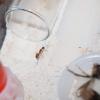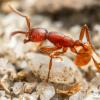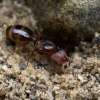Hey, y'all!
I've finally collected a colony of this elusive genus! Not the larger Proceratium chickasaw or Proceratium pergandei I have been hoping for, but it's a great start! I flipped over a fairly large rotting pine log and broke it open to reveal the mature Camponotus chromaiodes colony inside, from which I was going to gather some brood for my C. pennsylvanicus as they aren't doing as well as I'd hoped. After looking through the log for a bit I noticed several Proceratium workers and a few dozen tiny larvae in a small chamber off to the left of the C. chromaiodes colony's galleries. The wood was soft and fairly moist, so I carefully cut out that chamber with my knife and placed it in a damp collection container I always have on hand when I think I might find cryptics. After searching for a few minutes, carefully scanning that portion of the log I saw another piece of wood where a larger individual and several larvae were tucked in a corner. That larger individual turned out to be the queen and I cannot believe that she wasn't lost when I broke open the log like that. I put her in a snap cap vial with the larvae and what few spider eggs they had and removed wood until I found the rest of the workers and brood and aspirated them up. In total I was able to collect about 40 workers, a single dealate queen and a few dozen larvae and spider eggs.
Here's a terrible picture from before I dumped the workers from the aspirator in with the queen:




















